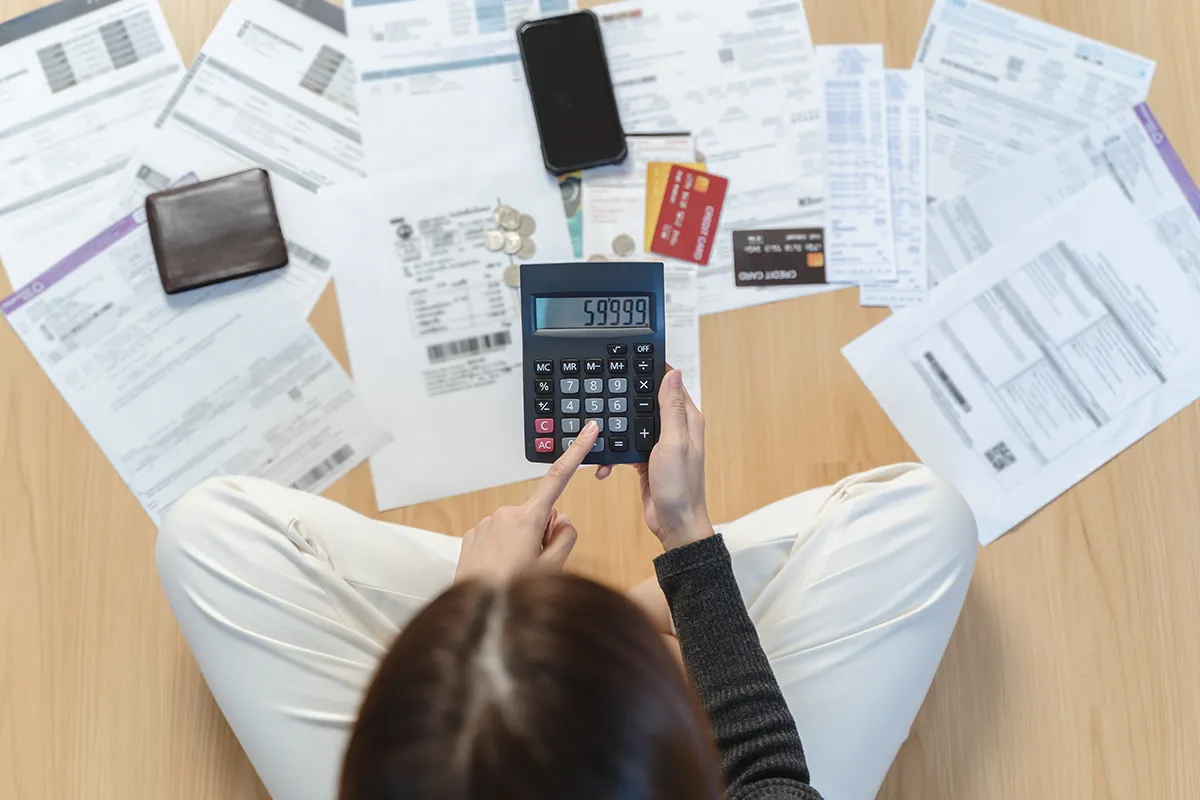How to Know if You Are Facing Financial Difficulties
One of the perils involved with gradually taking on additional credit card debt and using credit cards irresponsibly is that the individual does not always know when financial difficulties are slowly but steadily creeping closer to their doorstep.
Having access to additional credit lines that can be used for purchases and experiences that make life seem more enjoyable while the wolf isn’t yet at the door can be terribly misleading. Like all debt, credit card debt must eventually be repaid, and when an exogenous event such as a job loss or medical emergency takes hold, things can get nasty in a hurry.

Even absent such an event, the gradual, steady buildup of debt can inevitably lead to financial troubles when recklessness or overconfidence are part of the equation. So, how do we know when we are facing financial difficulties? Let’s take a closer look.
How Much Debt Do You Owe?
Even when an individual has a stable, reasonably well-paying job while carrying only moderate debt (let’s say some combination of credit card debt and student loans), that person could be closer to financial difficulties than they may realize because of financial behavior that is left unchecked. Therefore, it is important to know the warning signs.
For instance, you should always know exactly how much debt you currently have – not an approximate number, not a ballpark number – but the exact figure, each and every month. You should write it down! It should appear detestable to you – like something that you want to exterminate away – because it is! Keeping a written monthly tally of your precise debt level will make it more likely that you continue the process of paying your debt down as rapidly as possible.
ABC
Credit Card Warning Signs
If one or more of your credit cards is maxed out or dangerously close to the credit limit, that’s a warning sign of impending trouble. If you’re making only the minimum payments on your cards, that’s another warning sign. In either of these situations, by implication you are carrying a revolving debt balance each month that is likely accruing interest expense.
If your card is not on a promotional rate, this means you are accruing expensive high-interest rate expense on your revolving debt balance that is impeding your ability to pay off the principal balance on your cards.
Finally, if you are using or have used low interest rate promotional credit card checks (or worse, high-interest rate cash advances) as a source of cash flow to pay regular monthly bills, that is a serious warning sign that you are heading toward financial difficulties. Though it may have seemed convenient at the time, you are unquestionably adding to your debt load by using these checks or cash advances, not to mention any fees and interest expense that come along with doing so.
More Warning Signs That You Are Facing Financial Difficulties
If you make late payments on any bills consistently or have recently been hit with a checking or debit card overdraft fee, these are signs that you are losing control of your personal money management.
Missing credit card payments will impact your credit score and profile while also causing late fees that must be paid. If you have recently been turned down for a credit card or loan, that is a sign that lenders are finding you an increasing risk and may not deem you as creditworthy as you once were.
30% of a FICO score relies upon the credit utilization ratio, which is the percentage of available indebtedness across all of your credit lines that you have actually borrowed. For example, when your credit card balances are close to their limits, your credit utilization ratio will be high, negatively impacting your FICO credit score and perceived creditworthiness to lenders.
Separately, if you have recently withdrawn any funds from your retirement account prematurely in order to pay bills and living expenses, that is a sure sign that you are facing financial difficulties. Retirement savings are expressly denoted for the future and not the present – breaking that promise to yourself is a big red flag that you’re not on the right track financially.


Do You Have an Emergency Fund?
You should. Every careful consumer should have an emergency fund comprised of a minimum of three months of expenses (ideally more) in the event of a sudden job loss or medical emergency. If you don’t have an emergency fund today, get about the business of saving enough each month to build one.
If the prospect of saving enough each month to accumulate an emergency fund seems impossible given your current cash flow and expenses, this is a warning sign. If you are operating without an emergency fund and can’t build one, this is a warning sign that you are one dose of bad luck away from financial trouble.
What will you do in the event you lose your job, incur sudden expenses related to your car, or suddenly face high medical bills? Sounds like a recipe for taking on more credit card debt or some form of personal loan to make it through the rough patch. Don’t put yourself in that situation if you can at all avoid it! Build an emergency fund.
Do You Have Health Insurance?
If you don’t, you’re inviting potential financial difficulties. A written monthly budget that accounts for all sources of disposable (after-tax) income and all types of expenses can keep you out of trouble by indicating what sort of constraints you are operating within and forcing you to respect them.
A good place to start with creating a budget is with the 50/30/20 rule, which stipulates that 50% of disposable income gets allocated to necessary expenses (housing, food, transportation, utility bills, etc.); 30% to “wants” (restaurant meals, entertainment, new clothes, etc.) and 20% to savings and debt repayment.
Having a written budget forces us to come up with accurate figures for all of our expenses – and sometimes our necessary expenses can exceed 50% of our after-tax income. When this happens, we still must keep savings and debt repayment at 20% – any shortfall goes to the “wants” category, which we will have to cut back on.
A clearly written budget such as one dictated by the 50/30/20 rule will prevent us from falling behind on bills, as well as from taking on additional credit card debt when we shouldn’t be doing so. Very importantly, a written monthly budget also insures that we devote a significant percentage each month to debt repayment and savings.


Do You Have a Written Monthly Budget?
If you don’t, you’re inviting potential financial difficulties. A written monthly budget that accounts for all sources of disposable (after-tax) income and all types of expenses can keep you out of trouble by indicating what sort of constraints you are operating within and forcing you to respect them.
A good place to start with creating a budget is with the 50/30/20 rule, which stipulates that 50% of disposable income gets allocated to necessary expenses (housing, food, transportation, utility bills, etc.); 30% to “wants” (restaurant meals, entertainment, new clothes, etc.) and 20% to savings and debt repayment.
Having a written budget forces us to come up with accurate figures for all of our expenses – and sometimes our necessary expenses can exceed 50% of our after-tax income. When this happens, we still must keep savings and debt repayment at 20% – any shortfall goes to the “wants” category, which we will have to cut back on.
A clearly written budget such as one dictated by the 50/30/20 rule will prevent us from falling behind on bills, as well as from taking on additional credit card debt when we shouldn’t be doing so. Very importantly, a written monthly budget also insures that we devote a significant percentage each month to debt repayment and savings.
Are you in debt? we can help

About The Author: Steven Brachman
Steven Brachman is the lead content provider for UnitedSettlement.com. A graduate of the University of Michigan with a B.A. in Economics, Steven spent several years as a registered representative in the securities industry before moving on to equity research and trading. He is also an experienced test-prep professional and admissions consultant to aspiring graduate business school students. In his spare time, Steven enjoys writing, reading, travel, music and fantasy sports.
Get Debt Relief
Connect with licensed debt specialists dedicated to supporting your long-term financial well-being.

Ready To Get Started?
See if you qualify for debt relief. Get A Free Savings Estimate to see how quickly you can be debt free.
Embrace financial freedom with our tailored solutions, expert guidance, and unwavering commitment to your success.
Experienced Professionals
Our team comprises seasoned experts who have successfully navigated countless clients towards a debt-free life.
Customized Solutions
We understand that every financial situation is unique. That’s why we craft bespoke debt relief plans tailored to your specific needs.
High Success Rate
Our track record speaks for itself. Our effective strategies and dedicated approach ensure tangible results.
Confidential Consultation
Your privacy is paramount. Rest assured, our consultations are carried out with the utmost discretion and confidentiality.
Explore other blogs











